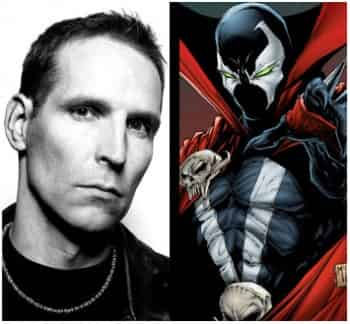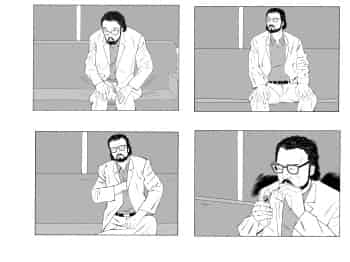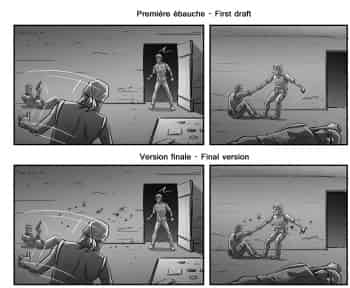Bonus
-
Self-promotion
Twenty years before Web publication was possible, Todd McFarlane had already identified the main benefits of auto-production: “I don’t got no lawyers. I don’t got no PR people. I don’t got no licensing people. I ain’t got shit! I hate to say it but I just proved that half those jobs at Marvel and DC are worthless. They could get rid of all of those guys and it’s not really going to affect the sales of their comic books, if you’re doing a comic book that taps into the heart of what the kids want right now. You don’t need a battery of people to produce big sales. What you need is a comic book that’s either good, glitzy, or happens to be tapping into whatever’s hot that week” (Gary Groth, “…That’s the Spice of Life, Bud: The Todd McFarlane Interview,” The Comics Journal, #152, August 1992).
-
The image as scripting tool
In the story “Tête-à-tête,” when Cesar meets Votan for the first time, he is naturally intimidated. However as he starts to understand Votan’s intentions, Cesar regains his self-confidence. We wanted this movement in the power relations to be visible in the drawings. That’s why we decided to show Cesar’s posture on the sofa.
-
Should authors censor themselves?
Graeme MacMillan raises a troubling question: “I wonder what comics we’ve missed out on because creators self-censored or were too afraid to push ideas that they initially wanted to do, but felt would never get published…?” (“The Biggest Blockade to the Creation of the Content Is Creators Not Choosing to Create the Content,” Newsarama, May 21, 2013.)
We’ve already talked about the changes we made to our stories because we felt our initial ideas weren’t strong enough, or on the contrary were too strong, and how that caused the story to implode. Are we talking about censorship here or just clarity? Naturally the choices we make create a direction for our stories.
-
Touch-ups (The Transaction)
Comics are a team endeavour. It sometimes happens that the writer will ask an artist to modify an image to enhance the overall consistency. We asked for several small touch-ups to this story: the impact of bullets on the wall, falling debris, some clothing details, cellphone towers, eyeglasses, etc.
-
Are spoilers damaging?
Graeme McMillan asks a very good question about the damage that spoilers actually cause: “How important are spoilers, anyway? I wonder that, sometimes. There are plenty of stories that rely on a shock last minute reveal for a certain amount of drama and tension, of course, but that is rarely the only value of a story; there has to be something more to it, surely, otherwise the story can only be read once, because any re-reads would be pointless in light of you knowing the big secret. While knowing a spoiler ahead of time can rob the story of one kind of appeal, shouldn’t good stories have more to offer, and therefore have a different-yet-equal appeal even if you know the ending ahead of time…?” (“How Bad Are Spoilers, Anyway?” Newsarama, May 13, 2013). So spoilers are only really damaging if the story doesn’t have any consistency or any real depth that would incite a reader to come back to it.





